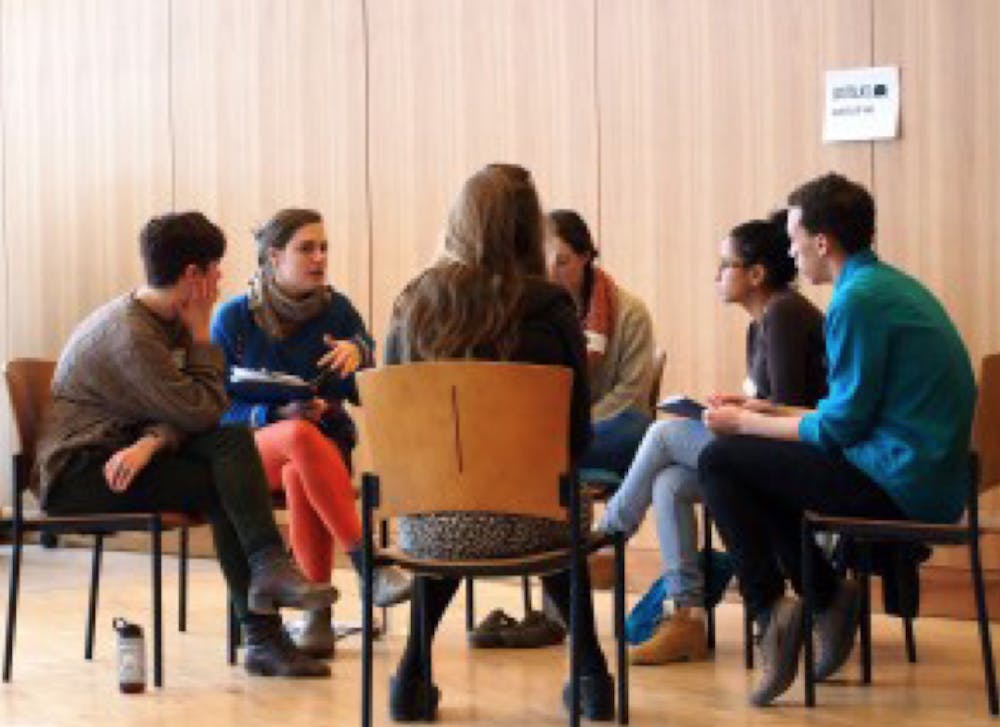Beginning as a forum in 2011 dedicated to fostering conversations surrounding identity and diversity issues, “JusTalks” is now being expanded into First Year Seminars.
The genesis of JusTalks began with a group of students who sought to combat the issue that, according to their website, postulates, “There is simply no time or space at Middlebury within the confines of a twelve week semester to have dialogues about matters of identity or diversity, race, gender, sexual orientation, class, ability, personal history, privilege, and religion, among others. [These are all] important personal and societal issues for us to take time to deconstruct, to explore, and to reflect on.”
In Winter Term of 2012, the JusTalks leaders invited students to participate in this daylong event, which consisted of small group exercises and discussions led by a student facilitator, run in a similar fashion to Midd Uncensored. The following year, the event was limited to first-year students as a way for JusTalks to progress toward its initial goal of creating a program for first-years only.
While these two winter events were attended on a voluntary basis, JusTalks is working on expanding to become a mandatory component of the first-year experience. This fall, JusTalks began its pilot JustTalks First Year Seminar discussion sections in five seminars.
“It became clear that a one day event in January wasn’t enough to fully explore these subjects,” Kate McCreary ’15, one of the JusTalks coordinators, said. “We also heard feedback from the administration that suggested in order to make it mandatory, JusTalks would have to fit in with existing structures at Middlebury. The idea to align with First Year Seminars then came about.”
Each JusTalks seminar meets once a week and is led by two former facilitators. It lasts for one hour with no outside homework. Each week there is a designated session that each class discusses and engages in relevant activities, such as film screenings, reflection writing, and article reading.
“It’s a combination of showing students something and asking for their reactions, and then connecting their experiences to Middlebury,” McCreary said.
The process began last spring when members of the group reached out to professors who they thought might be interested in partnering with JusTalks.
“Most seminars have some
sort of social justice orientation. These seminars are good starting points because they do have connections. First-years will hopefully be able to make the connections between the JusTalks discussion sections and the seminars they’re in,” Molly McShane ’16.5, another JusTalks coordinator, said.
First Year Seminars with the JusTalks component include Associate Professor of American Studies Susan Burch’s Disability, Different, and Society course, Assistant Professor of History Maggie Clinton’s Fascism and Masculinity, 1919-1945 course, Visiting Assistant Professor of Geography Kacy McKinney’s Global Youth course, Assistant Professor of Political Science Kemi Fuentes-George’s Globalization course, and Visiting Assistant Professor of Literature Victor Valcik’s Narratives of Identity course.
Over the summer, the JusTalks members worked to create a new curriculum that would complement the First-Year Seminar syllabus. The curriculum, unlike for the previous J-Term events, was developed with no outside consultants.
“We’ve reached out to professors to help give us information about their classes, and then we adjusted those to help us figure out what would be best for the first-years and what sorts of activities we could do with them,” McShane said. “Professors have been extremely helpful in helping form our curriculum,” she continued.
Although only five out of around 40 First Year Seminars have these JusTalks discussion groups, the numbers did not come as a surprise. Originally the JusTalks members reached out to around seven or eight seminars specifically that they felt would work well with their methodology. However, the issue of making the JusTalks discussions mandatory was most difficult.
“I think a lot of professors felt protective of their students’ time and recognized that freshmen are busy and oftentimes overwhelmed,” McCreary said. “I don’t recall any professors having an ideological resistance.”
According to both McShane and McCreary, the process to make a student-run entity like JusTalks a mandatory program would be a long one.
“I think this is another step in a long push to make this something that every freshman participates in. We’re hoping that this structure of attaching it to a First Year Seminar will work in a really positive way,” McCreary said.
“It’s really incredible to think that for some of the first-years whom we’ll be working with this fall, this will be the only time that they engage deeply with people who aren’t on their team or on their hall. I think it’s so important to make [a program like JusTalks] mandatory,” McShane said.




